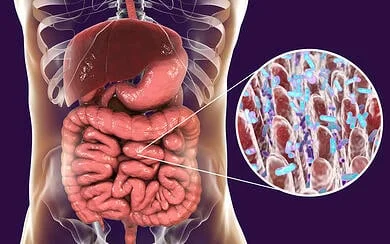
The human Gut contains trillions of bacteria inside our body, also called gut flora or microbiome. Those tiny unicellular organisms play an unfathomable role in overall health. Healthy gut flora improves gut health, heart health, brain health, weight management, and blood sugar regulation.
While most of these thousands of bacterial species are friendly, others are not. The friendly ones have several benefits, including aiding digestion, vitamin K production, folate production, and destroying harmful bacteria. However, specific day-to-day diet and lifestyle choices can negatively impact the population of these friendly bacteria – and overall health.
5 Daily Lifestyle that Negatively Impacts the Friendly Gut Bacteria Production
1. Not Eating a Wide Range of Foods
Gut flora diversity is critical for a healthy microbiome, as it enhances recovery from harmful physiological disturbances. Unfortunately, the western diet is losing due to the economic pressures associated with increased food production. The bulk of diversity once pervaded it over the past few decades. FAO (Food and Agriculture Organization) mentions 75 percent of the world’s food comes from only 12 plants and five animal species. That is not very good for our microbiomes, mainly since the western diet rarely includes all food sources.
In 2010, a study compared human intestinal microbiota from children characterized by a modern western diet and those on a rural diet (composed mainly of whole foods with high fiber content). Researchers found that the children on a rural diet had a more diverse gut flora and better gut health.
So, what do you do? Eat a more diverse array of foods – specifically whole foods. Unlike their highly processed counterparts, whole foods generally contain a more comprehensive range of nutrients, encouraging the growth of diverse bacterial species.
2. Inadequate Prebiotic Consumption
Prebiotics are a kind of fiber that passes through the Gut without being digested. Although eating this kind of fiber may seem like a waste of digestion time. But in reality, it encourages the growth of friendly bacteria in the Gut. For instance, high-fiber fruits such as apples with indigestible pectin make up 50% of their total fiber content. It has have shown to promote the growth of helpful microbes like Bifidobacteria.
A total lack of prebiotics in your diet may prove harmful to your digestive health because it slows down the development and diversity of your gut flora. So, for proper microbiome development, you must incorporate foods rich in partially digestible or indigestible fiber into your diet. This category includes oats, nuts, onions, garlic, leeks, asparagus, bananas, Jerusalem artichokes, lentils, chickpeas, and beans.
Sticking to a well-structured, fiber-rich diet plan can be challenging, so supplementing with prebiotic fibers may be an option. According to a study of 30 obese women, a daily intake of prebiotic supplements over three months significantly promoted the growth of bifidobacterium and Faecalibacterium, which are highly beneficial bacteria.
3. Excessive Alcohol Consumption
You’ve probably heard how excessive alcohol consumption is harmful to your liver, heart, and brain. Still, you probably didn’t know that chronic alcohol consumption can also induce dysbiosis and affect gut health.
A study compared the gut flora of 41 alcoholics with ten healthy individuals with little or no daily alcohol consumption. The researchers found that 27% of the alcoholics suffered dysbiosis in their microbiome, while none of the non-alcoholics did.
A study compared the effects of three different kinds of alcohol (gin, red wine, and de-alcoholized red wine) on gut health. The gin has negatively affected the population of beneficial gut bacteria, while red wine improved it when consumed moderately. It is because red wine can have a polyphenol content.
4. Inadequate Sleep
Sleep deprivation links to various health problems, including heart disease and obesity. Research now shows that sleep deprivation also affects your microbiome health. According to a 2016 study, which examined the effects of short-term partial sleep deprivation on gut microbiota, the researchers observed that after two days of sleep deprivation (4 hours per night), some subtle but noticeable changes had occurred in the gut flora.
The sleep-deprived individuals showed “an increased Firmicutes: Bacteroidetes ratio, higher abundances of the families Coriobacteriaceae and Erysipelotrichaceae, and lower abundance of Tenericutes (all P < 0.05) – previously all associated with metabolic perturbations in animal or human models.”
For the sake of the microbiome, 6-9 hours of sleep each night is recommended. To achieve this, set and maintain a regular bedtime, cut out caffeine at least 6 hours before your rest, and turn off the lights, incredibly any blue light from electronic devices.
5. Inadequate Exercise
Many people skip regular exercise for various reasons, but inadequate activity perturbs multiple biological systems. Not only does it predispose us to weight gain, higher stress levels, and a higher chance of developing a chronic disease, but recent studies have shown it can also put your gut flora at a disadvantage.
According to a 2014 study published in Gut, the researchers found that professional rugby players “had a higher diversity of gut microorganisms, representing 22 distinct phyla,” almost twice the figure observed in the control group matched for age, gender, and body size.
In another study that examined the “differences in gut microbiota profile between women with an active lifestyle and sedentary women,” the active women enjoyed a higher population of beneficial bacteria such as Bifidobacterium and Akkermansia. The study, therefore, concluded that regular exercise at low-to-moderate intensities helps the gut flora.
Conclusion on Microbiomes
Finally, suppose you want to enjoy all the benefits. In that case, a healthy microbiome can afford this 2019, eat a broader range of whole foods, take more prebiotics, minimize alcohol consumption, sleep more, and exercise regularly. Your Gut will thank you for it.


